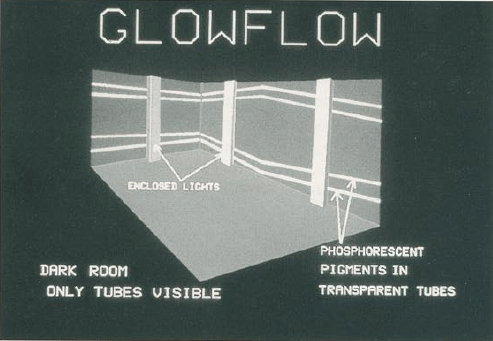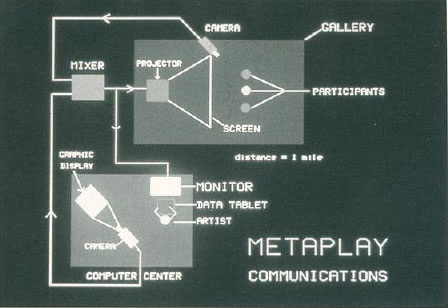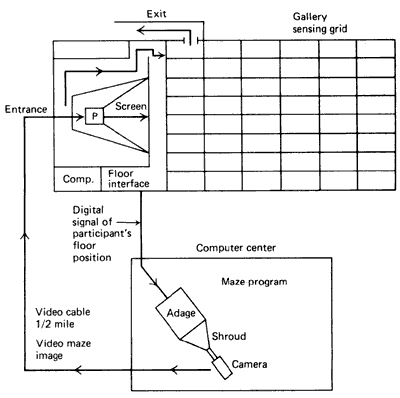


http://dada.compart-bremen.de/item/agent/527
https://www.youtube.com/watch?v=dqZyZrN3Pl0&&feature=emb_title
https://www.youtube.com/watch?v=d4DUIeXSEpk&&feature=emb_title
https://www.youtube.com/watch?v=dmmxVA5xhuo&&feature=emb_title
https://player.vimeo.com/video/15136354
https://www.youtube.com/watch?v=A6ZYsX_dxzs&
“I was surprised I had such strong ideas about what computer art should be. Art had never been important to me … I was surprised when none of the artists to whom I offered these ideas had any interest in them at all … If I wanted to see art that was important to me, I would have to create it. I would have to become an artist.” - taken from Dinner with Myron
What should you wear to an Artificial Reality http://mycours.es/gamedesign2016/files/2016/09/What-should-you-wear-to-an-Artificial-Reality-Myron-Krueger.pdf
Dinner with Myron http://2005to2007.fabrica.it/waitingforyou/files/dinner_with_myron.pdf
https://hplusmagazine.com/2015/01/22/welcome-mixed-reality/
Myron Krueger’s Beautiful Interface:
https://archive.org/details/Mondo.2000.Issue.07.1992/page/n97/mode/2up
https://aboutmyronkrueger.weebly.com/



Responsive environments: http://raley.english.ucsb.edu/wp-content/Engl800/Krueger-AFIPS.pdf
NASA X MYRON Symposium Vision-21: Interdisciplinary Science and Engineering in the Era of Cyberspace was held at the NASA Lewis Research Center on March 30-31, 1993: https://ntrs.nasa.gov/search.jsp?R=19940022855 A two dimensional artificial reality: https://ntrs.nasa.gov/search.jsp?R=19950007639
VIDEOPLACE The human-machine interface is generalized beyond traditional control devices to permit phy- sical participation with graphic images. The VIDEOPLACE System combines a participant's live video image with a computer graphic world. It also coordinates the behavior of graphic objects and creatures so that they appear to react to the movements of the participant's image in real-time. A prototype system has been implemented and a number of experiments with aesthetic and practical implications have been conducted.
http://thedigitalage.pbworks.com/w/page/22039083/Myron%20Krueger

Responsive environments This paper introduces the concept of a responsive environ-ment which perceives human behavior and responds with intelligent auditory and visual feedback. Several exhibits of responsive environments, implemented by the author, com-bining computer graphics, video projection and two-way video communication are described. VIDEOPLACE, an evolving exhibit which defines a conceptual telecommuni-cation environment uniting geographically separated people in a common visual experience, is discussed at some length. Based on these examples a new art form of composed man-machine interaction is defined. Finally, practical applica-tions are suggested for the fields of education, psychology and psychotherapy
Myron Krueger is one of the original pioneers of virtual reality and interactive art. Beginning in 1969, Krueger developed the prototypes for what would eventually be called Virtual Reality.
These "responsive environments" responded to the movement and gesture of the viewer through an elaborate system of sensing floors, graphic tables, and video cameras. Audience members could directly interact with the video projections of others interacted with a shared environment. Krueger also pioneered the development of unencumbered, full-body participation in computer-created telecommunication experiences and coined the term "Artificial Reality" in 1973 to describe the ultimate expression of this concept. http://www.ctheory.net/articles.aspx?id=328
Krueger famously developed computer systems and camera-based capture devices to create “Responsive Environments.” These systems allowed a person’s shadow to be captured, reduced to a single colour outline and then transported into the computer world where he or she would then interact with computer-based creatures and objects. Krueger wrote that “man-machine interaction is usually limited to a seated man poking at a machine with his fingers...I was dissatisfied with such a restricted dialogue and embarked on research exploring more interesting ways for men and machines to relate” (Krueger, 1977, pp. 105-6). Krueger developed many responsive environment technologies that evolved and eventually led to his most well-known work, Videoplace. file:///C:/Users/PC/Downloads/Art_Into_sciencescience_into_art.pdf
https://www.youtube.com/watch?v=x4_mK9CebB4&&feature=youtu.be
Nick Cave is an American fabric sculptor, dancer, and performance artist. Cave's family was large in size and always supportive of his artistic interests. He claims his upbringing gave him an artistic attentiveness to found objects and assemblages.
Oskar Schlemmer was a German painter, sculptor, designer and choreographer associated with the Bauhaus school. In 1923, he was hired as Master of Form at the Bauhaus theatre workshop, after working at the workshop of sculpture.

Louise Joséphine Bourgeois was a French-American artist. Although she is best known for her large-scale sculpture and installation art, Bourgeois was also a prolific painter and printmaker.


https://www.polygon.com/2016/10/26/13401128/25-vr-greatest-innovators
http://www.chrisoshea.org/out-of-bounds
I thought the black and white human video was zach’s daughter but then turned out that it was from this website! It has a lot of cool test videos 🙂 http://www.muonics.net/cvMovies/